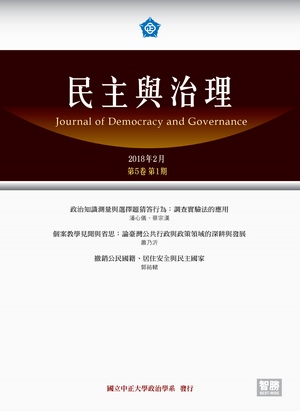Hot News
| 中文篇名 |
政治知識測量與選擇題猜答行為:調查實驗法的應用 免費試閱 | |
|---|---|---|
| 英文篇名 |
Measurement of Political Knowledge and Guessing in Multiple-Choice Items: An Application of Survey Experiment | |
| 作者 | ||
| 中文摘要 |
國內多數的調查研究者在使用選擇題型做為測量政治知識的工具時,存在受訪者因猜對答案而高估其知識程度的疑慮。本文認為,選擇題的猜答行為包含憑據猜答與盲目猜答,前者猜對反映受訪者的部分知識,而後者猜對則是機率。倘若受訪者多為憑據猜答,則無須過度擔憂高估知識程度的問題。本文以大學生為研究對象,以心理情境題組直接詢問受訪者的猜答行為,以探究其究竟是憑據猜答或盲目猜答。此外,本文應用調查實驗法蒐集受訪者在相同題目但同時有開放題型與選擇題型的回應,並以此回應推論受訪者的政治知識程度。本文同時提出以選擇題選項做為輔助資訊以推論受訪者的知識程度,並與心理情境資訊進行比較。分析結果顯示,受訪者猜對多屬於憑據猜答,而以選擇題選項做為輔助資訊能適當地推論知識程度。本研究結果可做為調查研究者使用選擇題測量政治知識的參考與依據。 | |
| 英文摘要 |
For the measurement of political knowledge, researchers may prefer open-ended items to multiple-choice questions because they are concerned about blind guessing which leads to the overestimation of knowledge levels. In this research note, we distinguish informed guessing (i.e., guessing the correct answer based on partial knowledge) from blind guessing (i.e., guessing the correct answer randomly). We focus on college students and conduct a survey experiment with the techniques of confidence ratings. The results show that informed guessing is more common than blind guessing. We also show that, based on the results of our survey experiment, using multiple-choice items and the information on choice-options can appropriately reflect respondents’ knowledge levels. | |
| 關鍵詞 |
盲目猜答、政治知識、調查實驗、憑據猜答、選擇題、盲目猜答、政治知識、調查實驗、憑據猜答、選擇題、blind guessing、political knowledge、survey experiment、informed guessing、multiple-choice item | |
| 刊名 | ||
| 期數 | ||
| 起訖頁 |
001-027 | |
| 出版單位 |
國立中正大學政治學系 | |
| DOI | ||
| QRCode |
| |
| 下一篇 |



